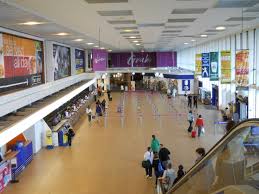
Police will be out in force at Scottish airports this summer to raise awareness of female genital mutilation.
FGM is illegal in Scotland, yet it's estimated at least 3, 000 girls and young women have been subjected to the painful practice here.
Safer Travel Days have been identified throughout the summer at airports across Scotland. These airports either have flights direct to countries where FGM is carried out or act as transit hubs for onward travel to these countries. Officers will be handing out information leaflets, which outline what FGM is, the legislation it contravenes and which partners can provide support and advice to anyone affected by FGM. Action will take place over the summer holidays to remind people that this is an offence but also that there are avenues of support open to those who might need it.
Detective Chief Superintendent Lesley Boal, Head of Public Protection said: “FGM is one of the severest forms of child abuse. It will not be tolerated in Scotland.
"We are taking direct action at airports across Scotland to remind people that this is an offence, that they can still change their minds and that support is available should they need it.
“School holidays are an opportune time to remind people flying to countries where this practice takes place. Girls and young women can be taken abroad and return with no-one the wiser about what they may have suffered.
“We would remind people that FGM is a very serious crime. It is also a crime to take a girl out of the country to undergo FGM. We will take action against anyone who facilitates FGM. We will continue to work with partners in non-governmental organisations and in local communities to prevent this abuse.
“If anyone is worried that this might be why they are travelling abroad or someone they know is being taken abroad, then please contact Police Scotland on 101 or one of our partner agencies. We can help and we will do everything we can to put a stop to this abhorrent practice.
“If you are in the UK and think that you are at immediate risk, please contact the police by dialling 999.”
Joanna Barrett, NSPCC Scotland said: "Many children in communities where female genital mutilation is common suffer considerable harm because of this unacceptable and barbaric practice.
"Police Scotland’s Safer Travel Days are an important way of drawing attention to FGM and helping bring it to an end. "We understand families can face complex pressures and our specialist helpline is here to help. By being there for parents, the public and professionals who have concerns or need advice 24 hours a day we want to make it easier to disclose and prevent female genital mutilation."
Dr Gillian Smith, Director for Scotland at the Royal College of Midwives, said: “FGM is an abhorrent act of violence against women and girls and falls very clearly in to the category of child abuse. It must be stopped both here in the UK and globally.
“Although considerable progress has been made over the last few years, raising awareness and introducing measures to stop this practice continuing, it is still happening and all possible efforts must be used to eradicate this abuse.
“Girls and women have the right to live free of the complications associated with this practice which can be lifelong and incapacitating. This initiative and partnership with Police Scotland will make a significant contribution towards that. It is only through all the relevant agencies such as health services, education and the police working together with communities and survivors that this can be stopped.”
Jan Macleod from the Women’s Support Project said:“We know that there are girls in Scotland at risk from FGM, and so we welcome this awareness campaign by Police Scotland.
“FGM is a long standing traditional practice which causes harm to girls and women. Many justifications are given for the practice and parents may believe that it is in the best interests of their daughters. Some parents come under pressure from family and/or community to arrange FGM for their girls and it is important that any parent in this position knows that they can approach agencies such as Police, Health or Social Work to help them protect their daughters.
“We would like to see all key agencies working with communities to make sure that parents are aware of the law and that woman and girls know where to get help or treatment if needed.”
According to the Scottish Refugee Council there are nearly 24,000 people living in Scotland who were born in one of the 29 countries identified by UNICEF as a FGM practising country including Nigeria, Somalia, Egypt, Kenya, Sudan and Eritrea which are the largest communities represented in Scotland.
Police Scotland works closely with a range of partners to raise awareness, to engage with communities and to protect and support women and girls affected by FGM. Officers say they will fully investigate any reports made to them and take action to ensure that perpetrators are held to account.


 6°C
6°C
 4°C
4°C
 12°C
12°C